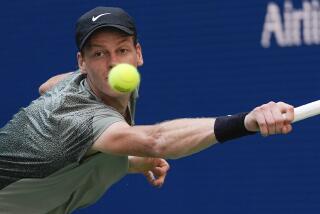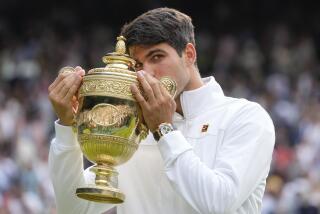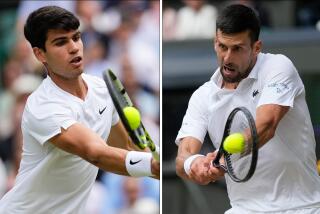Wimbledon Is Rejuvenated by the Becker of Old : Tennis: He outlasts Pioline in the match of the tournament. Agassi, Sampras and Ivanisevic also reach semifinals.
WIMBLEDON, England — Tennis broke out after a week of controversy Wednesday. It took Boris Becker to remind us what he, and Wimbledon, are all about.
Becker, who won his first Grand Slam title here in 1985 as a 17-year-old, evoked memories of his diving, scrambling will to win in his five-set marathon victory over France’s Cedric Pioline in the men’s quarterfinals. The 4-hour 14-minute match was the most compelling so far in the tournament and a refreshing respite from the antics that have taken center stage/court in recent days.
The third-seeded Becker outlasted Pioline, 6-3, 6-1, 6-7 (8-6), 6-7 (10-8), 9-7.
Becker joined Andre Agassi, Pete Sampras and Goran Ivanisevic in advancing to the men’s semifinals Friday. It was the first time in the tournament’s 109-year history that the top four seeded players from both the men’s and women’s sides advanced that far.
Top-seeded Agassi defeated Jacco Eltingh, 6-2, 6-3, 6-4; second-seeded Sampras defeated Shuzo Matsuoka, 6-7 (7-5), 6-3, 6-4, 6-2; and fourth-seeded Ivanisevic defeated Yevgeny Kafelnikov, 7-5, 7-6 (11-9), 6-3.
In Friday’s semifinals, Becker will play Agassi and Sampras will play Ivanisevic.
Becker’s match on Court 1, the All England Club’s most intimate setting, began in the afternoon and finished in the deep shade of twilight. As the match progressed, thoughts were of the tumbling, knee-scabbed Becker of 10 years ago--the only unseeded player to win Wimbledon.
He won here twice more, but Becker is too proud to invoke past triumphs. His present is too much in his thoughts. After his third-round ouster in the French Open, a subdued Becker, 27, said that he didn’t have that many more opportunities to win the only Grand Slam title he doesn’t own.
Becker has been written off everywhere but in his mind. Since his marriage two years ago and the birth of his son last year, Becker has been portrayed as contented family man, puffing a pipe and slipping into a cardigan.
“I remember 10 years ago it was very normal, once you passed 25, to get married and start a family,” Becker said. “I was a bit disappointed by the saying, a year and half ago, ‘He’s over the top, he’s not hungry anymore.’ At a certain time, you can’t pretend you are a teen-ager. My desire for tennis hasn’t changed at all. I think the other way. It has almost gotten more as I got older.”
In the face of his effort Wednesday, Becker’s desire to win cannot be questioned. He lost his serve only once. In a match that had 58 games, Pioline had only two break points.
“He’s not for five years in the top 10 just because his name is Becker,” said Pioline, ranked No. 58. “He’s playing good tennis. He won the match. I didn’t give it to him.”
The Frenchman said he played as if he weren’t there in the first two sets, but it was Becker’s presence that dictated the score. Every time he sensed Pioline’s serve weakening, he rushed the net, forcing Pioline to make difficult passing shots.
By the fifth set--with no tiebreaker played--both players were doing deep knee bends and stretching. Pioline had strained a stomach muscle, which he said hindered his serving. Becker said he might have been able to play for 30 minutes more.
In the final game, with Pioline serving, Becker had two match points, but Pioline worked it back to deuce before finally sending a backhand long to end the match.
The day’s other matches offered less drama.
Agassi’s return of serve is recognized as the best in the game, but grass courts bring out his ability to hit passing shots.
“Every possibility he had to make a good passing shot he took it,” Eltingh said. “Not only a good passing shot cross, but also down the line and also the running lob. After two sets, it’s hard to tell where he’s going to play the shots. It’s very unpredictable, very solid and steady.”
Agassi has been gathering speed in the tournament and improving some aspect of his game in every match. He said he couldn’t have done more Wednesday.
“Today was the best I hit the ball yet, bar none,” Agassi said. “I can go back a couple of days, I could go back a year, two years. This is the best I’ve hit the ball. I’m really striking it cleanly and taking it early and playing offensively and not making too many errors. Whenever you can piece those things together, good things happen.”
Eltingh was up a break in the third set and came close to earning another. But he chose a low percentage shot for his return, a backhand chip down the line that sailed wide.
“I should have at least put it in the court to make him play,” Eltingh said. “When he passes me then, at least I put it in the court. That’s the point that will stay with me for most of the time, I think.”
Sampras played a virtual unknown, excellent timing for him as he played his most uneven match of the fortnight. Once again, his serve proved fickle. He managed five aces to Matsuoka’s 21.
“I was pretty worried, losing the first set, 3-3, 0-40,” he said. “I didn’t like the way things were going at that point. My serve was very inconsistent, up and down. My serve throughout the last week and a half hasn’t been great. That’s my best shot. I’m going to have to play a little bit better if I want to continue in this tournament.”
Serving was the key element of another quarterfinal. Kafelnikov and Ivanisevic played like two gunboats seeking to blow each other out of the water. The velocity of their serves was remarkable. Ivanisevic came into the match with a tournament-leading 104 aces and served 33 Wednesday. Kafelnikov had 18 aces.
After losing the first set, Kafelnikov’s best chance to get back into the match was in the second-set tiebreaker, in which he held a 10-9 lead and was faced with an easy volley. He blew it.
“If I had won the second set, it might be totally opposite,” Kafelnikov said. “Just unlucky, unfortunate. It was a Goran day today.”
More to Read
Go beyond the scoreboard
Get the latest on L.A.'s teams in the daily Sports Report newsletter.
You may occasionally receive promotional content from the Los Angeles Times.











